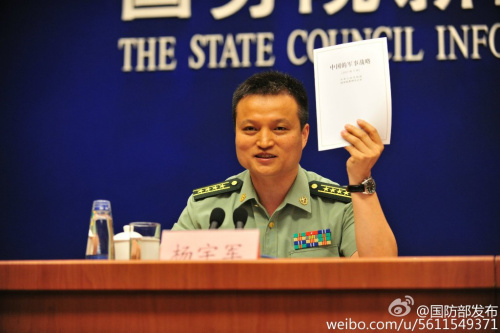


(File photo)
While China has a firm resolve to defend the country's national sovereignty, maritime rights and interests, it advocates solving disputes through negotiation and maintains "maximum restraint", military experts told People's Daily Online in a discussion on the White Paper about China's military strategy.
The White Paper: China's Military Strategy was published on May 26, 2015, which outlines China's "Active Defense" strategy.
On May 27, three distinguished experts from the Academy of Military Sciences PLA China, including the deputy director of Defense Policy Research Center Wen Bing, deputy director of Military and Strategic Studies Department Zhao Dexi, and researcher Yu Miao came to the Qiangguo Forum of People's Daily Online to communicate directly with netizens about the document.
Zhao Dexi said during the interview that stability is a major feature of military strategy, as a general base on which to prepare and direct the construction and utilization of military power, and most military strategy would not alter because of a single event. However, military strategy still needs to evolve to keep pace with the times.
The White Paper declares China's military security policies to the world from a strategic perspective, expresses China's reasonable concerns on security, and raises China's proposals for security cooperation. Some people are currently misreading or misunderstanding China's military strategy, some are intentionally stirring up trouble amidst questions on the transparency of the Chinese military, and some are deliberately provoking rumors of "China's military threat". The publication of White Paper: China's Military Strategy is intended as a response to these concerns.
It is stated in the White Paper that "in the foreseeable future, a world war is unlikely", but also that, "the world still faces both immediate and potential threats of local wars", and that "it is a long-standing task for China to safeguard its maritime rights and interests."
Wen Bing notes that stressing the first statement is a fundamental assessment of the international security situation. The trend of peace, development, cooperation and win-win is unstoppable. With more countries joining the drive to strengthen cooperation and preserve peace, more powers that could put a hold on any major war are emerging.
But problems still exist around the world – problems like historical issues, national and religious contradictions, territorial sovereignty disputes and international terrorism.
Based on the statement "it is thus a long-standing task for China to safeguard its maritime rights and interests", Wen says that with some countries intentionally stirring up trouble, illegally occupying territorial islands of China, and meddling in the South China Sea issues, the situation is getting more complex.
Nevertheless, while China has a firm resolve to defend the country's national sovereignty, maritime rights, and interests, it advocates solving disputes through negotiation and maintains "maximum restraint", in trying to avoid aggravating maritime issues. "China respects other countries' sovereignty, and other countries should also respect China's sovereignty in return," said Wen.
 J-11 fighters in air exercise
J-11 fighters in air exercise Beauties dancing on the rings
Beauties dancing on the rings Attendants-to-be join Mr. & Miss Campus Contest
Attendants-to-be join Mr. & Miss Campus Contest Beijing's toughest anti-smoking law takes effect
Beijing's toughest anti-smoking law takes effect Family lives in cave for about 50 years in SW China
Family lives in cave for about 50 years in SW China PLA soldiers operating vehicle-mounted guns in drill
PLA soldiers operating vehicle-mounted guns in drill Blind carpenter in E China's Jiangxi
Blind carpenter in E China's Jiangxi China hosts overseas disaster relief exercise for the first time
China hosts overseas disaster relief exercise for the first time 20 pairs of twins who will become flight attendants in Sichuan
20 pairs of twins who will become flight attendants in Sichuan Obama is sowing discontent in S.China Sea
Obama is sowing discontent in S.China Sea Rescuers work through night to reach cruise ship survivors
Rescuers work through night to reach cruise ship survivors Driving through limbo
Driving through limbo Facing down MERS
Facing down MERSDay|Week